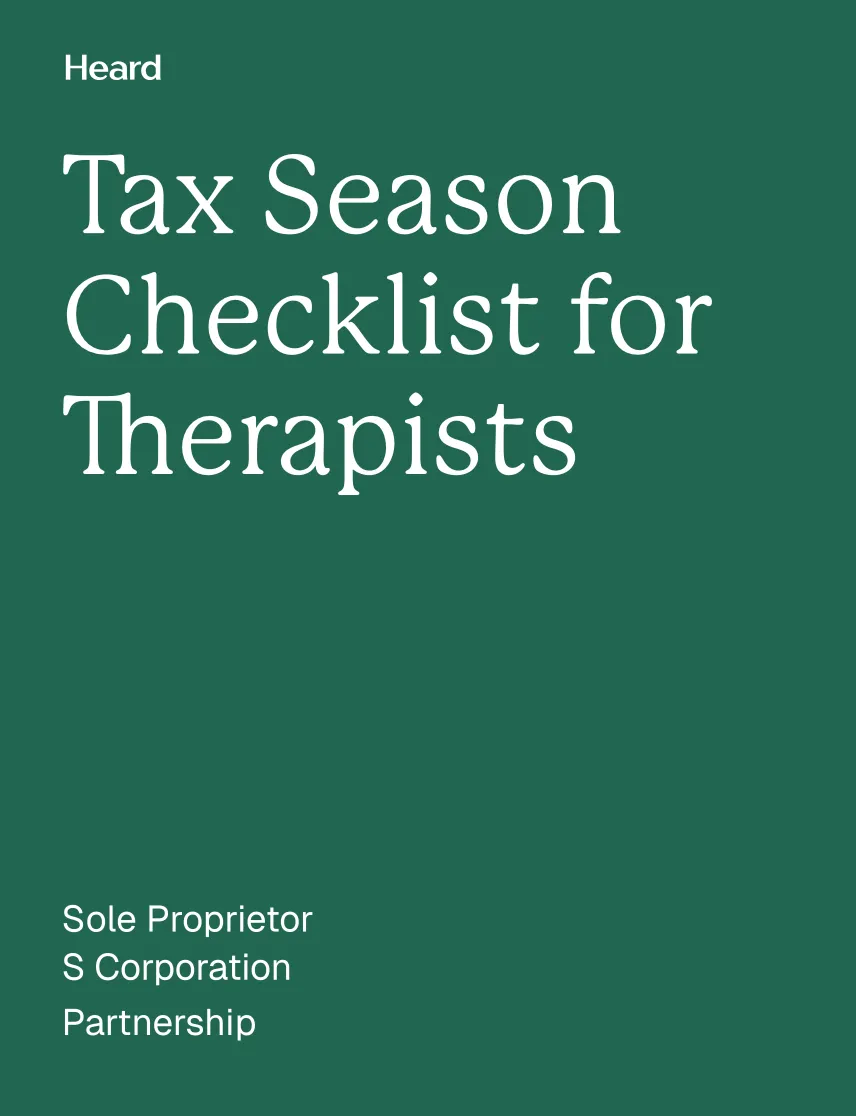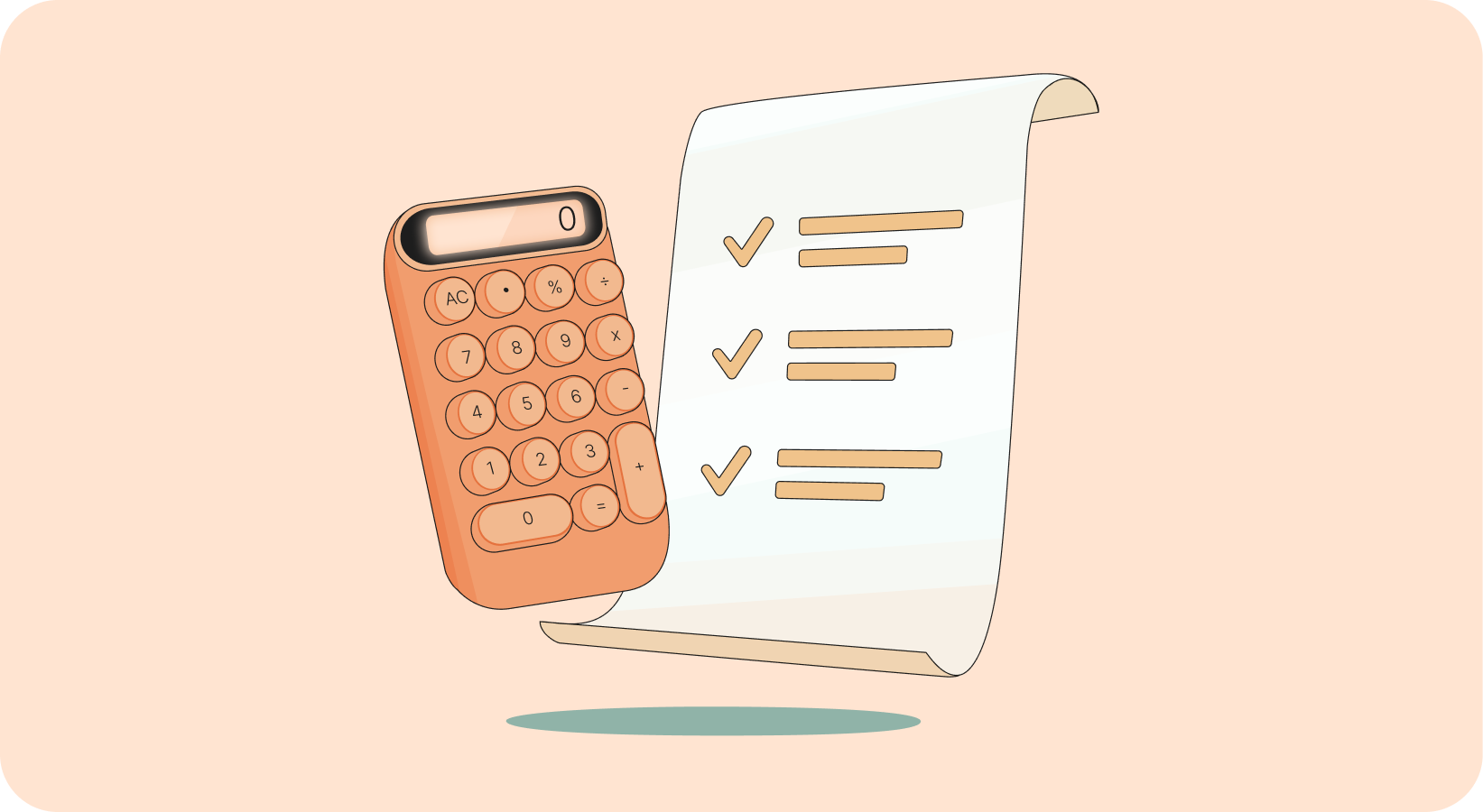Doing your taxes as a therapist in private practice—from preparation to filing—can feel like an overwhelming task. But tax season doesn’t have to leave you knotted up with stress and anxiety.
In fact, by taking a few steps to get organized, you may find you almost enjoy doing your taxes (just us?). Tax season is a chance to look at how your business did last year and make plans for the future.
Follow this guide to create a tax season to-do list for your private therapy practice, wrap up a tax season free from overwhelm, and get back to what matters most: your clients.
{{resource}}
When to file taxes for your therapy practice
The tax filing dates for your therapy practice depend upon two factors:
- Your business entity type. Different entities have different deadlines.
- The precise tax deadlines for the 2026 tax year. While tax deadlines are roughly the same year-to-year, they move to later dates in years when they fall on weekends or national holidays.
Once you determine your entity type, you can figure out when to file by checking the list of deadlines below.
Typical business entity types for private practice therapists
In most cases, if you run your own private practice, it operates either as a sole proprietorship or an S corporation.
You can think of a sole proprietorship as the default business entity for small businesses in the USA. As soon as you go into business for yourself and start making a profit, the IRS considers you a sole proprietor. For tax purposes, your personal income and the income of your business are one and the same.
Many sole proprietors choose to elect S corporation status. A one-person S corporation is similar to a sole proprietorship: all business income is taxed as personal income. However, electing S corporation status gives you some liability protection, and may come with tax benefits.
S corporation income is taxed along with your personal income, but you’re still required to report it separately. For a deeper dive, check out our article, How do I switch from a sole proprietorship to an S corporation?
Tax deadlines for private practice therapists
Here are the 2026 tax deadlines for both sole proprietors and S corporations.
{{resource}}
How to get your bookkeeping in order
Two good reasons to get your bookkeeping in order now:
- So you or your accountant can see, in detail, all your expenses for the year, and take advantage of every deduction possible.
- Keeping orderly books year-to-year lets you see how your business grows and changes—so you can identify any small problems before they become big problems, and plan ahead for the years to come.
At the end of the year, you need to close your books. As part of that, you may also need to reconcile your bank account. If you haven’t done either yet, that’s okay—but take care of them ASAP!
Close your books
When you close your books at the end of the year, you make sure all financial transactions for the year are complete and reported, so your records are up to date. Then you use those records to create financial statements summarizing the health of your business.
If you have a bookkeeper, they’ll handle this for you. Otherwise, it’s up to you to get the job done. These are the steps to follow:
- Make sure all income for the year has been received, and reported on the books. This could mean getting in touch with clients to make sure their bills are paid.
- Ensure expenses for the year have been paid and reported on the books.
- Categorize all of your expenses for the year.
- Reconcile your bank account. This is only necessary if you use the accrual method of accounting—more info on this below.
- Double check employee and contractor info. If you have employees or contractors, you’ll need to issue them Form W-2s and Form 1099s, respectively. Make sure you have the information you’ll need to file those forms.
- Generate year-end financial statements. You may use accounting software to generate financial statements for your business, or your accountant may do it for you.
Heads up: Your year-end financial statements summarize your financial activity for the year. In order for your financial statements to be accurate and useful for filing taxes, your books need to be accurate and up to date as well. That’s where hiring a bookkeeper can help.
Reconciling your bank accounts
There are two methods of accounting: The accrual method and the cash basis method.
You need to reconcile your bank accounts if you use the accrual method of accounting. When you use the accrual method of accounting, you record income (accounts receivable) and expenses (accounts payable) at the moment they’re billed.
If you use the cash basis method of accounting, every time your business earns or spends money, you record it at the same time it appears in your bank account—not when it’s billed.
If you use the accrual method and you’ve never reconciled your books, talk to a qualified CPA, or get in touch with our tax experts. This task is typically best handled by a professional.
{{resource}}
Get your paperwork organized
Got a box of receipts or a pile of old client bills marked “PAID”? It’s time to gather them together, get them organized, and file them away for the future.
It’s extremely unlikely the IRS will audit you. But in the event you’re randomly selected for auditing, and don’t have documents backing up your income and expenses, you could face heavy fines.
The statute of limitations on your tax return is six years—meaning, if you get audited in 2027, the IRS could be looking for receipts from 2021. It’s important to have a long-term filing solution in place.
Gather your client bills
If you use claim filing software and/or an electronic billing system, you should already be able to access all of your paid client bills for the year. Download local copies to a USB or external harddrive, and keep it as part of your files.
Scan your receipts
If you have paper receipts for business expenses, an app like Expensify lets you record them with your phone’s camera, organize them, and keep them stored digitally. If possible, download copies to keep offline.
Get ready to file
Once your books are closed and you have all your documents together, you’ve got all the essentials in place to file your taxes.
If you have an accountant, it’s time to book an appointment with them. If you’re filing your taxes yourself, take these three extra steps to make sure you’re fully prepared.
Determine how you’ll pay your taxes
Have you been setting aside part of your income in order to cover taxes? If you haven’t, it’s time to prepare.
If you have enough savings set aside, you may want to earmark a chunk of cash to cover taxes. A good rule of thumb: Look at how much income tax you paid last year, and set aside that amount to cover this year.
If you didn’t set aside income and you don’t have enough savings to cover your tax bill for this year, you will likely need to arrange with the IRS to pay your tax bill in installments. (This is different from quarterly estimated taxes, which every sole proprietorship or S corporation owing over $1000 in federal taxes is required to pay.)
Heads up: Don’t go reaching for your credit card. Even if you’re late paying your income tax, the IRS will charge you significantly less in late fees than your credit card would charge interest on a cash advance.
Read up on tax reform
Tax laws change year to year, and while those changes are usually minor, they could affect you.
Forbes has a solid primer on the three major tax law changes for 2022 affecting individuals (and, by extension, sole proprietors and single-person S corps.)
Review tax deductions
Now is a good time to refresh your knowledge of tax deductions. For some deductions—such as the home office deduction—the amount you are able to deduct depends on the method you use to calculate the expense. It’s worth revisiting these just to make sure you’re saving as much as possible on your tax bill.
Get started with our list of the most valuable tax deductions for therapists.
{{resource}}
File your taxes
Unless you have a real love for licking envelopes, the easiest way to file your taxes is online. There are two online filing methods you can use: IRS Free File, and Free File Fillable Forms. Exactly which one you use will depend upon your income for the year.
IRS Free File
If your income for the year (revenue, minus expenses) is less than $73,000, you qualify for IRS Free File. With this method, you choose an approved third party provider, and use their in-browser app to complete your filing. The IRS lists eight Free File providers on their website, with comparisons of features.
Free File Fillable Forms
If your income for the year is over $73,000, you won’t qualify for IRS Free File—but you can use Free File Fillable Forms, which is available to business owners at every income level.
The process:
- Create a Free File Fillable Forms account
- Fill out electronic versions of your tax forms
- Submit them through your account
Fillable Forms will do some basic calculations for you, but it doesn’t check for errors. Bottom line, it doesn’t hold your hand the way IRS Free File’s providers do, and seems to be designed for business owners who already have experience filing their taxes and have simple, straightforward tax returns.
If you’ve never filed taxes for your business before, or your taxes this year are complex—you’re deducting many different types of expenses, or you have employees or contractors working for you—your best bet is to hire a professional.
Should you hire a CPA for your therapy practice?
Working with a CPA ensures your taxes are filed accurately and on time, and that you take advantage of as many tax deductions as possible. They can also answer any questions you may have about state taxes, or setting aside income for quarterly tax payments.
On average, having a CPA do your tax prep costs about $1,200. That’s for tax prep alone! You can significantly reduce that cost by using a service that combines bookkeeping, accounting, payroll, and taxes in a single service.
Heard pairs you up with real accounting experts who handle your practice’s bookkeeping for you, answer your questions, and get your taxes filed accurately and on time, year after year. Learn how Heard handles your taxes.
Heads up: Heard is currently accepting clients for the 2026 tax year and beyond.
Conclusion
You can make your tax season low-stress and manageable by closing your books and supporting documents organized ASAP. You can make it even easier by hiring a qualified tax filer to do the work for you.
Got questions about tax forms, quarterly taxes, and extensions? Get answers from our article on tax basics for sole proprietors.
This post is to be used for informational purposes only and does not constitute legal, business, or tax advice. Each person should consult their own attorney, business advisor, or tax advisor with respect to matters referenced in this post.
Bryce Warnes is a West Coast writer specializing in small business finances.
{{cta}}
Manage your bookkeeping, taxes, and payroll—all in one place.

Discover more. Get our newsletter.
Get free articles, guides, and tools developed by our experts to help you understand and manage your private practice finances.





